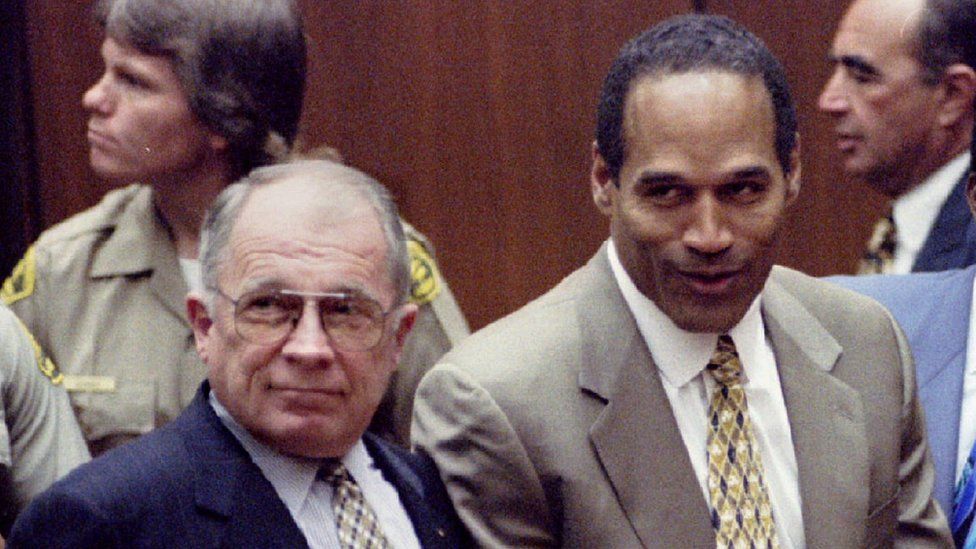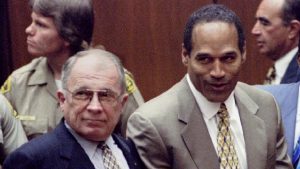The Death of an American Celebrity Lawyer
The Death of an American Celebrity Lawyer

His name was Francis Lee Bailey Jr. When I graduated from law school in 1982, all the law students and lawyers knew who he was. In the legal community there were two celebrity lawyers in the United States that all of us knew about — F. Lee Bailey and Melvin Belli.
Belli was born in 1907 and was older than Bailey. When I graduated from law school, he was 65 years old. Bailey was born in 1933, so he was 47 when I graduated.
Belli was known by insurance claims adjusters throughout the United States as the “King of Torts.” That title was given to him by Life Magazine writer Robert Wallace in a 1954 article about Belli’s unprecedented success in obtaining record-breaking awards from juries for clients who had been severely injured or had died because of accidents that were caused by the carelessness of others.
Belli was a celebrity lawyer, in part, because he represented some of the top celebrities in America, including Chuck Berry, Errol Flynn, Muhammad Ali, Zsa Zsa Gabor, The Rolling Stones, and Jim and Tammy Baker. His most famous cases involved people who were injured or who had died in the MGM Grand Hotel fire in Las Vegas, the Benedictine birth defect cases, the collapse of the Kansas City Hyatt walkway, and the Korean jetliner disaster.
Belli was licensed to practice law in California and was married six times. Five of his marriages ended in divorce. He married his sixth wife three months before he died unexpectedly in 1996 from complications associated with pancreatic cancer. He was 88 when he died.
Belli was a larger-than-life superstar who was bold, relentless, and creative. He was the first lawyer to master the use of demonstrative evidence which aided him in convincing juries to rule in favor of his clients. Demonstrative evidence is generally defined as models, photographs, videos, animals, human skeletons, prostheses, and other objects and devices that are used to demonstrate in a dramatic way the facts that the lawyer is attempting to prove. In the legal community, because of his pioneering work in demonstrating to juries the extent of his clients’ injuries, Belli was known as the “Father of Demonstrative Evidence.”
After I graduated from law school and started my law practice, I read as much as I could about Belli and his techniques for using demonstrative evidence in a trial. Of the more than 60 books that Belli wrote, his most important one was “Modern Trials,” which was a multivolume set of textbooks on demonstrative evidence. One of the keys to my early success in the courtroom was my effective use of demonstrative evidence. I did not learn how to properly use demonstrative evidence in law school. I learned it from Melvin Belli.
I thought about Belli last week when I read that F. Lee Bailey, who was 87 years old, had died. Like Belli, Bailey was a larger-than-life superstar celebrity lawyer. He had a near-photographic memory that allowed him to ruthlessly cross-examine witnesses and make them appear as though they were dishonest or hiding facts from the jury. A few of his most famous cases were:
● The Patty Hearst Case – Hearst was the granddaughter of the famous newspaper publisher, William Randolph Hearst. When she was a sophomore in college, she was kidnapped from her apartment by the Symbionese Liberation Army (SLA), which was a domestic terrorist group. She was targeted by the SLA because she was from a wealthy, well-connected family and the SLA thought they could use her to gain leverage over the Hearst family’s political influence to free two SLA members who were in jail. She was locked in a closet for several weeks and was threatened, assaulted, and raped by two of the members of the SLA. She was “persuaded” by the SLA to participate in a bank robbery and was arrested in 1975. She was charged with bank robbery and using a firearm during the commission of a felony. The judge in the case prohibited Bailey from presenting compelling evidence that Hearst participated in the robbery because her life had been threatened by the SLA. The jury found her guilty of the charges.
● The Dr. Samuel Sheppard Case – Sheppard was a well-known osteopathic physician-neurosurgeon in Ohio who was convicted in 1954 of murdering his wife. Years later, Bailey agreed to represent Sheppard, and in 1966, Bailey succeeded in reversing Sheppard’s murder conviction. The case inspired both a television series and a movie, both of which were called “The Fugitive.”
● The O.J. Simpson Case – Bailey’s most famous case was the O.J. Simpson murder case, which took place in 1995. Simpson was a former football star and had achieved celebrity status because of several movies that he had acted in, as well as product endorsements he had done for several major corporations. His superstar status was confirmed in 1975 when People magazine described him as “the first black athlete to become a bona fide lovable media superstar.” The jury ended up finding Simpson not guilty of the murder of his former wife, Nicole, and her friend, Ronald Goldman.
Bailey was licensed to practice law in Florida and Massachusetts, and he was disbarred and his license was taken away in both states in 2001 and 2003, respectively. The reason he was disbarred was because of his alleged misconduct in his representation of marijuana drug dealer Claude Louis duBoc.
Bailey was married four times. He had three divorces and his fourth wife died in 2006. He had a girlfriend that he was living with when he died. He filed for personal bankruptcy in 2016 and claimed that he had very little assets and owed more than $5 million in taxes. According to a phone interview with The Detroit News, Bailey said that his bankruptcy was a consequence of his representation of duBoc. He said that he was paid by duBoc in shares of a Canadian pharmaceutical company, which was an arrangement that the U.S. Government approved and then rejected after the price of the stock more than quadrupled. The government argued that Bailey was acting as a trustee of the stock and a judge ordered him to turn over the stock to the government. At that time, the stock was worth several million dollars.
After I read about the death of Bailey, I did some research on the internet to find out what, if any, religious influence he had while he was growing up. I also tried to find out if Melvin Belli was raised in a religious environment. I spent more than 45 minutes searching the internet and I could not find any reference to either of them ever having taken part in any religion. I was also unable to find any reference as to whether they believed in God.
It has become a habit of mine to quickly research the religious past of any celebrity that I’m interested in. By using a couple of different search engines, it’s usually easy for me to quickly discover what I’m looking for. I’m not sure why I have a desire to find out if a well-known celebrity who died was a member of a religion or had a belief in God. I suppose it’s because I’m always hopeful that what I will find is that the person who died had a deep and abiding faith in God. Why would I care about that? Because as a general rule, we humans develop an affection for the celebrities that we like and identify with.
My interest in or affection for a celebrity compels me to find out about their faith in God. If I find that they had a strong belief in God before they died, I feel a sense of relief that they are either in Heaven or will eventually get there after their souls have been purified in purgatory. If I’m not satisfied by what I read about the celebrity’s faith and beliefs, I get upset. That’s what happened when I was unable to find any reference to Melvin Belli’s or F. Lee Bailey’s religious upbringing or whether they believed in God. There is a strong likelihood that if they had been raised in a religious environment or if they had a strong belief in God, I would have been able to find something about it.
We were all created in the image and likeness of God — not so we could acquire untold wealth by using the gifts, abilities, and talents God gave us, but so we would use our gifts, talents, and abilities to know, love, and serve God in this world, and then enjoy happiness with Him in His kingdom, for all eternity.
As usual, after doing my research to find out if there was any evidence that Melvin Belli and F. Lee Bailey believed in God, I was very frustrated. There was no indication that either of them ever used their God-given gifts to frequently perform what we Catholics call the corporal and spiritual works of mercy.* After getting frustrated with the way they apparently “wasted” the gifts they were blessed with, I ended up questioning myself as to whether I’m using the gifts, talents, and abilities that God gave me in the way that He intended. That’s what I always end up thinking about after I research the faith of a celebrity who has died. It’s always a scary thought, especially in light of the fact that I will have to answer for my selfishness and failure to follow God’s plan when I face Him immediately after I breathe my last breath.
Are you using the gifts, talents, and abilities that God gave you in the way that He intended?
______________________________________________________________________
* As a reminder, the corporal works of mercy are feed the hungry, give drink to the thirsty, clothe the naked, shelter the homeless, visit the sick, visit the imprisoned, and bury the dead. The spiritual works of mercy are instruct the ignorant, counsel the doubtful, admonish the sinner, bear wrongs patiently, forgive offenses willingly, comfort the sorrowful, and pray for the living and the dead.





3 Comments
Thank you for these quick summaries of celebrity lawyers. To these I would add Clarence Darrow, a generation earlier than Melvin Belli, who was an atheist and the noted protagonist in the Scopes Monkey Trial, memorialized in the play and movie, Inherit the Wind. He also represented Leopold and Loeb who thought they could murder a young boy and get away with it, just for the thrill of it. His defense kept them from the electric chair. He was an atheist.
Dan – Yes, it would have been interesting to see how Clarence Darrow would have fared if he had lived during the age of TV and the modern media. Would he have been hired by big-time Hollywood celebrities to represent them? Unfortunately, we’ll never know the answer to that question. Take care, Harry
There is no indication that any of them repented from their sins with their own mouth and turned to Jesus, the only one that removes our sins. Show me their fruit. Any branch that does not produce fruit will be cut off and thrown into the fire. There is no one good, no not one. Our works are as filthy rags before The Holy God.